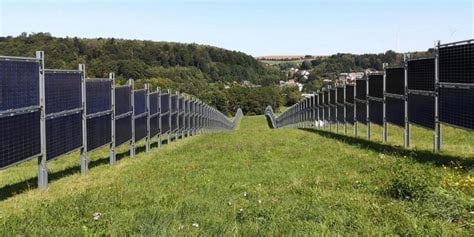embedded machine learning research engineer - georgist - urbanist - environmentalist
- 216 Posts
- 503 Comments

 34·3 months ago
34·3 months agoAnd things like vertical bifacial solar panels can work especially amazingly on grazing land that isn’t suitable for crops.

Counter-intuitive as they may look, they actually have a number of benefits:
- The panels face east and west, meaning they generate peak power in the morning and evening, which corresponds to peak demand => less need for energy storage to bridge the gap between the mid-day peak in production from traditional PV and the aforementioned morning and evening demand peaks.
- The panels are vertical, which makes them easier and cheaper to maintain, as dust, snow, and rain naturally shed from their surfaces.
- The panels get less direct energy during mid-day, keeping their surfaces cooler. Turns out cooler solar panels are more efficient at converting light energy into electrical energy.
- The arrangement lends itself very naturally to agrivoltaics, which means you can derive more yields from a given piece of land and use less land overall than if you had segregated uses.
- The compatibility with agrivoltaics allows farmers to diversify their incomes streams and/or become energy self-sufficient.
Plus, why do people act like the “incumbent advantage” is some magical advantage? It’s a cargo cult mentality, especially in this day and age where all the old “rules” about elections have gone out the window.
I mean, I remember the day where being twice-impeached and a convicted felon would be unrecoverable political death, yet here we are staring down the barrel of a possible second Trump term.
Biden is a historically unpopular president, who is behind in basically all polling in basically every key swing state, and who just had the mother of all “the emperor has no clothes” moments on national television, losing the confidence of his own base. Even Democratic congresspeople are calling on him to step down now.
There is simply no path forwards for Biden to win in November. He’s cooked.
As for replacements, personally, I think Gretchen Whitmer is the best choice. Relatively young, good compromise candidate between the progressive and moderate wings of the party, current beloved governor of Michigan (key swing state!), competent technocrat, no significant political baggage, and made a name for herself protecting abortion rights in Michigan after SCOTUS overturned Roe v. Wade.

 41·3 months ago
41·3 months agoIs the GOP actually the ones wanting us to replace Biden at the moment? If anything, there’s a very good reason to believe the GOP would want Biden to remain: he’s a quite unpopular president for whom the overwhelming majority of Americans have concerns about his age and mental fitness. Further, he has a ton of political baggage, and is highly contentious amongst Democrats.
Personally, I genuinely think Gretchen Whitmer (with Pete Buttigieg as running mate) would be much more likely to win in November, at least according to post-debate polling from this leaked internal memo: https://puck.news/wp-content/uploads/2024/07/SUNDAY_Post-Debate_Landscape_2024_06_30__1_-1.pdf

 11·3 months ago
11·3 months agoLeaked internal memo with post-debate polling data showing a strong preference for Biden alternatives (especially Whitmer and Buttigieg) in key swing states: https://puck.news/wp-content/uploads/2024/07/SUNDAY_Post-Debate_Landscape_2024_06_30__1_-1.pdf
 1·5 months ago
1·5 months agoExactly. I’ve seen it with faaaaaar too many tankies and even populist leftists. Instead of advocating for empirically-driven policy that would measurably improve the world, there’s a ton of rhetoric about how we just need to punish capitalists/fascists/landlords/neolibs/billionaires/etc. harder to fix the world’s problems.
At this point, I think it’s just a deep-rooted flaw of the human psyche that we’re just inclined towards trying to force our solutions through by punishing those who oppose us, rather than trying to deeply understand the dynamics at play and changing the underlying structure to incentivize the outcomes we want.
And if we fail to address the tendency towards knee-jerk, brute-force, authoritarian “solutions” to problems within our own ranks, we’ll meet the same fate as every other revolution-turned-brutal-dictatorship.

 8·5 months ago
8·5 months agoThe raison d’être for RISC-V is domain-specific architecture. Currently, computational demands are growing exponentially (especially with AI), but Moore’s Law is ending, which means we can no longer meet our computational demands by scaling single-core speed on general-purpose CPUs. Instead, we are needing to create custom architectures for handling particular computational loads to eke out more performance. Things like NPUs, TPUs, etc.
The trouble is designing and producing these domain-specific architectures is expensive af, especially given the closed-source nature of computer hardware at the moment. And all that time, effort, and money just to produce a niche chip used for a niche application? The economics don’t economic.
But with an open ISA like RISC-V, it’s both possible and legal to do things like create an open-source chip design and put it on GitHub. In fact, several of those exist already. This significantly lowers the costs of designing domain-specific architectures, as you can now just fork an existing chip and make some domain-specific modifications/additions. A great example of this is PERCIVAL: Open-Source Posit RISC-V Core with Quire Capability. You could clone their repo and spin up their custom RISC-V posit chip on an FPGA today if you wanted to.
It also had a second rule set where a land value tax was implemented, and the winning condition was when everyone made a minimum amount of money.
A land value tax (LVT) is a levy on the value of land without regard to buildings, personal property and other improvements upon it.[1] It is also known as a location value tax, a point valuation tax, a site valuation tax, split rate tax, or a site-value rating.
Some economists favor LVT, arguing it does not cause economic inefficiency, and helps reduce economic inequality.[2] A land value tax is a progressive tax, in that the tax burden falls on land owners, because land ownership is correlated with wealth and income.[3][4] The land value tax has been referred to as “the perfect tax” and the economic efficiency of a land value tax has been accepted since the eighteenth century.[1][5][6] Economists since Adam Smith and David Ricardo have advocated this tax because it does not hurt economic activity, and encourages development without subsidies.
LVT is associated with Henry George, whose ideology became known as Georgism. George argued that taxing the land value is the most logical source of public revenue because the supply of land is fixed and because public infrastructure improvements would be reflected in (and thus paid for by) increased land values.[7]
It’s just a stupidly good tax policy, and we should be implementing it in more places.

 111·5 months ago
111·5 months agoYeah, this is the one piece a lot of people miss: in any decently competitive market, individual firms have effectively zero power to set prices; they must instead accept the prices determined by the market.
Knowing that, the solution to that sort of corporate BS, then, is to ensure markets are competitive by busting monopolies, lowering barriers to entry, and getting money out of politics to reduce the effect of lobbying.

 1·5 months ago
1·5 months agoExactly. People love to treat it as “a war on cars/lawns/etc.”, but it’s really a war on everybody who doesn’t want to be legally mandated to have those. All we’re asking for is to end the legal mandates (zoning, parking minimums, setback requirements, etc.) and for those who wish to partake in those wasteful luxuries to pay their true price without public subsidy.

 0·5 months ago
0·5 months agoIt’s not, though. The classical factors of production, whence we get the concept of “capital” as a factor of production, has land and capital as clearly separate:
Land or natural resource — naturally occurring goods like water, air, soil, minerals, flora, fauna and climate that are used in the creation of products. The payment given to a landowner is rent, loyalties, commission and goodwill.
Labor — human effort used in production which also includes technical and marketing expertise. The payment for someone else’s labor and all income received from one’s own labor is wages. Labor can also be classified as the physical and mental contribution of an employee to the production of the good(s).
Capital stock — human-made goods which are used in the production of other goods. These include machinery, tools, and buildings. They are of two types, fixed and working. Fixed are one time investments like machines, tools and working consists of liquid cash or money in hand and raw material.
https://en.m.wikipedia.org/wiki/Factors_of_production
And it’s an important distinction. The fact that land is not made and inherently finite makes it zero-sum. Meanwhile, the fact that capital such as education, tools, factories, infrastructure, etc. are man-made and not inherently finite makes them not zero-sum. This distinction has truly massive implications when it comes to economics and policymaking. It’s the whole reason LVT is so effective, so efficient, and so fair: it exploits the unique zero-sum nature of land.

 0·5 months ago
0·5 months agoProperty taxes != Land value taxes
Further, it’s not a tax on capital; it’s a tax on land. It’s very explicitly designed to target land, as land has distinct economic properties that make it a prime target for taxation.
And yes, it does target speculative investments like those of Blackrock:
It reveals that much of the anticipated future tax obligations appear to have been already capitalised into lower land prices. Additionally, the tax transition may have also deterred speculative buyers from the housing market, adding even further to the recent pattern of low and stable property prices in the Territory. Because of the price effect of the land tax, a typical new home buyer in the Territory will save between $1,000 and $2,200 per year on mortgage repayments.

 10·6 months ago
10·6 months agoHow do so few people in this comments section see the obvious satire?? It’s clearly making fun of both landlords and absurd tipping culture.
 12·7 months ago
12·7 months ago
I’m personally in favor of land value taxes, externality taxes, and natural resource severance taxes.

 34·7 months ago
34·7 months agoIf they help to get people out of cars (including electric cars), I see them as a win. Orders of magnitude less impactful than cars.
Me, too. I haaaaaate mint toothpaste.
Just discovered coconut ginger toothpaste a little over a year ago. I’m sticking with this toothpaste for life.
I agree that I think worker coops elegantly solve certain problems (notably the principal-agent problem), but they also have certain drawbacks. Notably, they have more difficulty raising funds, they tend to be more risk-averse, they tend to be more growth-averse (people don’t like to dilute their own stake within the company with more people, but this means they don’t typically scale as easily or quickly to benefit economies of scale), and they tend to pay worse than hierarchical companies (counterintuitive as that may seem at first if the whole goal of market socialism is to have workers get more of their value back).
So is the solution to just throw our hands up and say, “Screw it, nothing we can do but let hierarchical organizations win”? Not quite. We still do see plenty of successful coops, notably in the form of credit unions. We also have unions and syndicalist solutions. We still have minimum wages (which are supported by most economists, as it turns out you can raise minimum wages a certain amount without raising unemployment because there’s often a non-zero amount of monopsony power in the labor market).
Further, I do think a Georgist system would empower labor much more than now. Without a housing crisis (thanks to LVT and YIMBYism), with a citizen’s dividend, with quality public education (education has positive externalities and thus deserves a Pigouvian subsidy), with more jobs (thanks to more economic growth and less rent-seeking), and with public works projects (essentially Pigouvian subsidies for things like environmental cleanup), I think labor would have much more bargaining power with employers.
For instance, the professional class right now gets good pay and generally good quality of life , despite rarely having unions or worker coops, precisely because they have high negotiating power with prospective employers.
My inclination is to strive for a more Georgist system, encourage unions, use minimum wages and government spending technocratically, and then see if more is yet needed.
But society already values flexibility as well. As a basic example, I was hired in my current job in large part because I have a relatively broad range of skills within my field, rather than being hyper-specialized in one particular thing. Sure, in an abstract world where replacing employees is frictionless and firms are all megacorps with tens of thousands of employees (or more), tremendous specialization would probably be more commonplace. But in our real world, companies value flexible employees who can respond to changing projects, requirements, conditions, etc., because just firing and hiring a new specialist costs times and money, and many companies (startups especially) can’t afford having thousands of specialists in every niche they touch upon.
Further, even specialists have to communicate and collaborate with other specialists, and they need to be able to understand each other well enough to do so. If you wanted to build robotics to pick tomatoes automatically, for instance, it would be ridiculous to hire one tomato farmer and one roboticist who know nothing about each other’s respective specializations. If neither has any flexibility or breadth of knowledge, it will be very difficult for them to communicate and collaborate to get the project working.
People live in an artificial binary where they believe communism and capitalism are the only two economic systems in the entire world.
I’ll be bold and say it outright: communism is a fundamentally broken idea and sucks balls, and so is capitalism, but both in similar-yet-different ways.
Communism is faulty economics and fails to differentiate between man-made capital and god-given land and natural resources, grouping both as “the means of production”. The problem with this is land and capital have very different properties. Where land (and natural resources) cannot be created and are zero-sum, capital must be created and is not zero-sum. Communism blatantly ignores this and has a zero-sum view on capital, meaning it suggests policies that fail to effectively produce new capital, and thus fail to effectively produce new wealth and prosperity. Further, when the state takes monopolistic control over land and capital (in addition to its existing monopoly on violence), it concentrates far too much power, which is why communist countries keep on becoming brutal dictatorships.
Capitalism, on the other hand, also fails to differentiate between land and capital, but in a different way. Instead of socializing both, it privatizes both, allowing massive rent-seeking and exploitation as a result of monopolization of land and natural resources. It also often willfully ignores that negative externalities and other market failures actually make society, on the net, poorer and less prosperous. Further, this concentration of wealth into the rent-seeking, monopolist class grants them more political power to make it even easier to rent-seek, further concentrating their own power and wealth.
What I want instead is a Georgist system that correctly identifies this distinction between land and capital, and then uses economically proven policies that respect the inherent differences between land and capital.

 16·7 months ago
16·7 months agoThe YIMBY movement (short for “yes in my back yard”) is a pro-Infrastructure development movement mostly focusing on public housing policy, real estate development, public transportation, and pedestrian safety in transportation planning, in contrast and in opposition to the NIMBY (“not in my back yard”) movement that generally opposes most forms of urban development in order to maintain the status quo.[1][2][3] The YIMBY position supports increasing the supply of housing within cities where housing costs have escalated to unaffordable levels.[4] They have also supported infrastructure development project like improving housing development[5] (especially for affordable housing[6] or trailer parks[7]), high-speed rail lines,[8][3]homeless shelters,[9] day cares,[10] schools, universities and colleges,[11][12] bike lanes, and transportation planning that promotes pedestrian safety infrastructure.[2]
YIMBYs often seek rezoning that would allow denser housing to be produced or the repurposing of obsolete buildings, such as shopping malls, into housing.[13][14][15] Some YIMBYs have also supported public-interest projects like clean energy or alternative transport.[16][17][18][19]
The YIMBY movement has supporters across the political spectrum, including left-leaning adherents who believe housing production is a social justice issue, free-market libertarian proponents who think the supply of housing should not be regulated by the government, and environmentalists who believe land use reform will slow down exurban development into natural areas.[20] YIMBYs argue cities can be made increasingly affordable and accessible by building more infill housing,[21][22][23]: 1 and that greenhouse gas emissions will be reduced by denser cities.[24]
A land value tax (LVT) is a levy on the value of land without regard to buildings, personal property and other improvements upon it.[1] It is also known as a location value tax, a point valuation tax, a site valuation tax, split rate tax, or a site-value rating.
Some economists favor LVT, arguing they do not cause economic inefficiency, and help reduce economic inequality.[2] A land value tax is a progressive tax, in that the tax burden falls on land owners, because land ownership is correlated with wealth and income.[3][4] The land value tax has been referred to as “the perfect tax” and the economic efficiency of a land value tax has been accepted since the eighteenth century.[1][5][6] Economists since Adam Smith and David Ricardo have advocated this tax because it does not hurt economic activity, and encourages development without subsidies.
LVT is arguably an ecotax because it discourages the waste of prime locations, which are a finite resource.[21][22][23] Many urban planners claim that LVT is an effective method to promote transit-oriented development.[24][25]








Some squatter who bought the rights to it for two twigs and a raspberry back when they were first selling off name rights 200,000 years ago